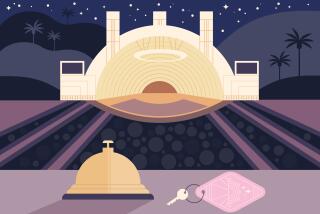WeHo as gay tourism destination
- Share via
If you plan on protesting a ban on same-sex marriage, what better place than West Hollywood, a town known nationwide as a center for gay activism and politics?
But go there on vacation?
West Hollywood -- where more than a third of the population identify themselves as gay, lesbian, bisexual or transgender -- is well-known to locals and draws many visitors from around the state. But it’s not a major national or international destination.
Now the city, eager to shore up revenues, wants to expand its reach. And it’s with good reason: Even in a slumping economy, gay and lesbian tourists tend to wield more disposable income and are more likely to spend on travel and leisure than heterosexual tourists, studies have shown.
Over the last few years, cities such as Philadelphia, Fort Lauderdale, Fla., Chicago and Bloomington, Ind., have launched campaigns to attract gay tourists.
The gay travel segment is so hot that American Airlines, among other large corporations, has a marketing manager whose job is to reach out to that demographic.
West Hollywood’s latest effort is spearheaded by a redesigned travel website (GoGayWestHollywood.com) that includes lists of hotels, clubs, bars and nighttime happenings that the visitors’ bureau believes would appeal to gay and lesbian tourists.
The site also includes a photo gallery and a list of weekly events, including several nightclub parties with sexually suggestive titles, and a section on the city’s raucous Halloween celebrations. The photos include shots of shirtless men in leather as well as scenes from recent rallies in opposition to a proposed ban on same-sex marriage.
The website’s content may raise a few eyebrows among outsiders, concedes Bradley M. Burlingame, president of the West Hollywood Marketing & Visitors Bureau.
But he pointed out that travel bureaus for exotic vacation spots that cater to heterosexual tourists often feature attractive women in bikinis.
“It’s not our purpose to be a vehicle for people to hook up,” he said. “But in reality, people sometimes go on vacation in hopes of meeting someone they might like.”
The city even has staff members in London and Berlin to arrange junkets for European journalists to come check out the scene.
The West Hollywood Marketing & Visitors Bureau does not have a separate budget for its campaign to attract gay and lesbian tourists, but last year’s annual budget was about $1.5 million, according to public records.
Several West Hollywood business owners applaud the visitors bureau’s strategy, saying gay and lesbian travelers are helping to keep the city’s tourism industry relatively healthy in the worst recession in decades.
“It’s a terrific market,” John Douponce, general manager of Le Parc Suites Hotel, a 154-room boutique hotel, said of gay and lesbian tourists. “They are very upscale travelers.”
James Sinclair, operator of the O-Bar Restaurant & Lounge on bustling Santa Monica Boulevard, said that marketing to gay and lesbian tourists made sense.
“This gives us a competitive advantage against our neighbors in L.A.,” Sinclair said.
Not only that, he said, but the campaign offers gay and lesbian tourists a destination where they can feel welcome.
“Why wouldn’t they come to see what it is like to be in a city of equal opportunity?”
But the main goal of the city’s campaign is to draw visitors who will spend.
A survey this year by Harris Interactive, a global market research firm, found that gay and lesbian tourists were expected to spend on average $2,300 for vacations during the spring and summer whereas heterosexual travelers planned to spend on average $1,500 for the same period.
West Hollywood commissioned a study in 2007 that reached the same conclusion. The marketing study found that 17% of all visitors to the city identified themselves as gay or lesbian. Those same tourists said they planned to spend $349 a day in the city, compared with $269 a day by heterosexual visitors, according to the study by Los Angeles-based Lauren Schlau Consulting.
Nationwide, gay and lesbian buying power has been estimated at $690 billion and is expected to reach as much as $835 billion in 2011, according to a Witeck-Combs/Packaged Facts survey released two years ago.
“That market segment is a very lucrative segment,” Burlingame said.
Like West Hollywood, tourism bureaus and travel companies across the country are making it clear that they welcome gay tourists.
“All travel marketers today are working harder than ever in this tough economy,” said George Carrancho, American Airlines’ marketing manager for outreach to gay and lesbian customers. “From my experience, however, the very smartest ones also express their welcome and reputation for inclusion to gay and lesbian travelers.”
In Southern California, West Hollywood may be entering into direct competition with Palm Springs, a desert resort town that has long billed itself as “America’s gay oasis.”
But Palm Springs doesn’t feel threatened by West Hollywood’s new campaign.
“I think the two can work together,” said Jim Dunn, executive director of the Palm Springs Convention Center.
Palm Springs has an outdoor appeal with hiking, golfing and Jeep tours of the mountains and deserts around the city, whereas West Hollywood has a more urban vibe and a wealth of nightclubs and bars along Santa Monica Boulevard.
John Tanzella, president of the International Gay & Lesbian Travel Assn., said more tourism bureaus from around the globe have joined his association and are launching campaigns to target gay travelers.
“The bureaus are looking for new revenue streams and the strength of the [lesbian, gay, bisexual and transgender] travel market is well documented,” he said. “The LGBT community is passionate about traveling.”
--
More to Read
Sign up for The Wild
We’ll help you find the best places to hike, bike and run, as well as the perfect silent spots for meditation and yoga.
You may occasionally receive promotional content from the Los Angeles Times.







